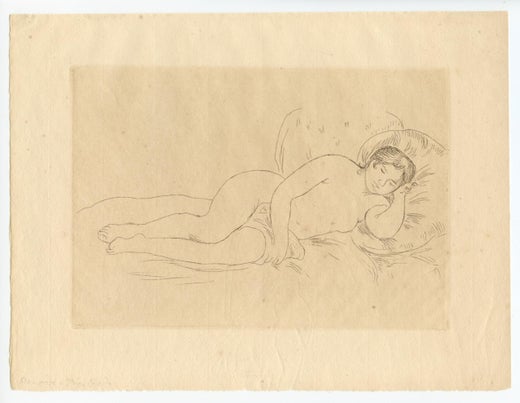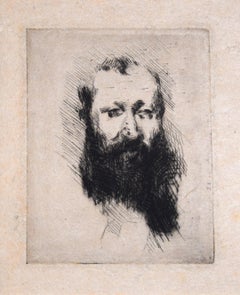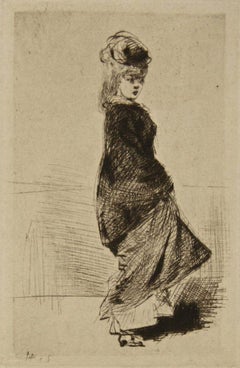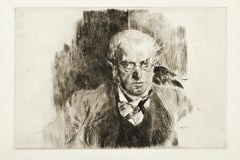Pierre-Auguste RenoirBerthe Morisot - Etching and Drypoint After A. Renoir - Early 1900Early 20th Century
Early 20th Century
About the Item
- Creator:Pierre-Auguste Renoir (1841-1919, French)
- Creation Year:Early 20th Century
- Dimensions:Height: 12.8 in (32.5 cm)Width: 9.85 in (25 cm)Depth: 0.04 in (1 mm)
- Medium:
- Movement & Style:
- Period:
- Framing:Framing Options Available
- Condition:Insurance may be requested by customers as additional service, contact us for more information.
- Gallery Location:Roma, IT
- Reference Number:Seller: M-1150391stDibs: LU65037504212
Pierre-Auguste Renoir
An early 20th-century master, Pierre-Auguste Renoir created thousands of figurative prints and paintings and is credited as one of the founders of the Impressionist movement. His frequently reproduced works are appreciated for their luminous appearance, rich colors and soft, feathered brushstrokes.
Renoir was born in Limoges, France, in 1841. He began painting as a child while working in a porcelain factory, which led to a formal study of art in Paris under Charles Gleyre. In the early 1860s, he often visited the Louvre to study French master painters, and he became friends with Claude Monet and Alfred Sisley, both leading Impressionists.
Renoir first exhibited his paintings in 1864, but he did not rise to prominence until his first exhibition with the Impressionists in 1874. In 1877, Renoir stopped exhibiting with the Impressionists and embarked on a series of travels. In 1881, he went to Algeria and Spain, meeting the artists Eugène Delacroix and Diego Velázquez. He continued to Rome, Sicily, Algeria and Guernsey, where he created 15 paintings in one month in the summer of 1883.
In 1890, Renoir married Aline Victorine Charigot, a portrait model and muse for many of his works. They had three sons, and in 1907, Renoir moved his family to the village of Cagnes-sur-Mer, near the Mediterranean. By this time, he had developed arthritis in his hands, and he had a stroke in 1912, after which he used a wheelchair. Renoir continued to paint for the rest of his life, even strapping a brush to his paralyzed fingers.
Shortly before his death in 1919, Renoir visited the Louvre to see his paintings now hanging next to the artistic icons that he used to study and admire. He returned to his home village and died in December of that year.
On 1stDibs, find Pierre-Auguste Renoir paintings, prints and sculptures.
You May Also Like
Late 19th Century Impressionist Figurative Prints
Drypoint, Etching
Mid-19th Century American Impressionist Figurative Prints
Drypoint, Etching
Late 19th Century Impressionist Portrait Prints
Drypoint, Etching
19th Century Impressionist Portrait Prints
Watercolor, Drypoint
19th Century Impressionist Portrait Prints
Drypoint
Late 19th Century Impressionist Portrait Prints
Drypoint, Color
Mid-20th Century American Modern Portrait Prints
Drypoint, Aquatint
Mid-17th Century Old Masters Figurative Prints
Laid Paper, Drypoint, Etching
Early 20th Century Post-Impressionist Portrait Prints
Handmade Paper, Rag Paper, Drypoint, Etching
1920s American Realist Portrait Prints
Drypoint, Aquatint
More From This Seller
View All1870s Impressionist Figurative Prints
Etching, Paper, Drypoint
1890s Modern Figurative Prints
Drypoint, Etching
1870s Modern Figurative Prints
Etching, Drypoint
1890s Modern Portrait Prints
Drypoint, Etching
1860s Figurative Prints
Drypoint, Etching
1880s Post-Impressionist Portrait Prints
Drypoint, Etching




